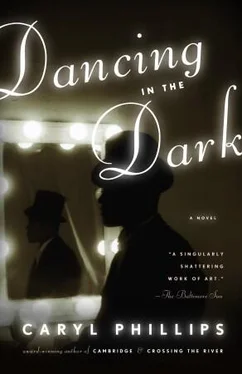The dressing room is where I dress, but it is also the place where I can set my true self to one side and put on the clothes and mind of another. A man I think I know, but despite what I tell George when the two of us are alone, the more I look at the modern world, the fewer of these men I discern. But the audience expects to see this man, and each night in my dressing room I have to find him, breathe life into him, make him walk, and talk, and grin. A wistful, sad, helpless man, but there is no doubt that the audience recognizes him. I slide one finger into the jar and work up a countenance that suggests the triumph of black velvet over my own light ebony. In my dressing room night will triumph over day. I watch my skin become black. But this is not me. Surely the audience understands this. This is simply a person that I have discovered, a person the audience claims to recognize.
And finally George speaks, but he is careful to keep his urgent voice low. Listen to me, Bert, the so-called character that you’re playing is a damn-fool creature who has been created by the white man, and this “smoke” fixes us in their minds as helpless failures. But times have changed now and we should no longer be standing up in front of the white man and delivering simplistic stories with the right amount of darky naivete. I mean, let me ask you, how many of our own people are truly happy to just eat watermelon, or fall over on their faces, or mispronounce the English language? Time to put the cork to one side, Bert. White people are laughing at you, and colored folks in the audience are only laughing to keep from crying. Who is this darky that you give them, Bert? This fool who is easily duped into idiotic schemes, with his gross stories, and jokes on himself? Who is this man whose laziness is such that he only stirs to life when somebody mentions a ghost? This pork-eating, chicken-loving, fat-lipped, big-bellied lover of food who wants to hear music that’s either melancholy, or something that he can jig to with big-foot, clumsy dancing. I told you already, not now, Bert. Not in the twentieth century. You gotta leave that man behind where he belongs, and it don’t matter a damn how much you want to talk about what you do as art, I’m telling you, please cut that colored fool loose.
George announces to the press that Abyssinia will finally open in New York City on February 20, 1906. He informs them that it will be a musical play in four scenes set in Addis Ababa, in Abyssinia, featuring a cast of one hundred performers, spectacu lar lighting effects, elegant costumes, a market scene, a waterfall, and live animals. Bert Williams will play Jasmine Jenkins and George Walker will play Rastus Johnson. An excited George explains that the drama concerns the pair of them escorting a group of colored Americans back to the barbaric splendor of Africa, where they encounter both adventure and danger in a plot that explores the theme of mistaken identity. However, when the production finally opens George is outraged at the critics’ opinion that the production is too long, and they declare that in large part the whole spectacle is pretentious and overblown, and that the live animals steal what is effectively little more than a pageant . Eventually, after thirty-one performances, their disappointed producer claims bankruptcy and the show, being far too expensive to maintain, quickly closes. Sadly, Abyssinia fails to be the artistic and creative breakthrough that George, in particular, so desperately craves, but what aggravates him the most is the claim of the vast majority of the so-called critics that Abyssinia ’s greatest failure is that it contains far too little of the colored coon Mr. Bert Williams presenting his celebrated corkface routines.
Aida tries to speak with Lottie, but the more tight-lipped Lottie becomes, the more Aida opens up until Aida eventually tells her what she realizes her friend probably already knows. George and the wild white girl. She knows about this, doesn’t she? Lottie nods slowly, understanding that she will have to confess, otherwise the conversation can go no further. Has Lottie ever met the woman with George? Lottie shakes her head and wonders if Aida has forgotten that she has done what Bert wished and retired from the stage. Lottie’s theatrical circle is shrinking. Has Lottie ever spoken to the woman? Again she shakes her head. The two colored women fall silent. Aida seldom walks the few blocks to visit with her, so when Lottie opened the door and saw the clearly sleep-deprived Aida standing before her she knew that something serious was troubling her friend. Aida has chosen her time well for the house is quiet and Lottie is alone. Does Bert know about the woman? To this Lottie can honestly answer that she does not know. Has Bert said anything to her about George? There is no reason for her to admit that conversations between herself and Bert are probably even less satisfactory than those between Aida and George. There is no need for her to divulge that she long ago learned not to probe the closed mind of her strange second husband. No, Bert has said nothing to her about George. He has said nothing to her about anything. He keeps himself to himself. She smiles at Aida, whose hurt is both public and private, but she has no advice to offer the poor woman, who, luckily, does not appear to be asking for any. So she decides to offer Aida some tea, and Aida nods and then, remembering her manners, she smiles.
Aida has been circling the Harlem streets for two hours, peering intently through the windows of various bars and cafés, loitering outside of the barbershops, even looking in the churches, but he is nowhere to be found. She is careful to make sure that her body language does not suggest that she is harboring any unease, but it is not until she begins to pass the same people for a second, and then a third time, their puzzled faces eloquent, that she eventually realizes that it is time for her to go home and wait in the privacy of their apartment.
Alone in bed, with the drapes drawn back. The unbearable lucidity of insomnia descends upon Aida. As night reaches, and then passes, its perfect pitch, she watches the slow light begin to bleed through the black; then through the blue-black; and then finally flood the sky. A new day.
. . .
Lottie feels guilty, for she failed to offer her friend any form of comfort or support. She has always known Aida to be a confident, unbreakable woman, and up until this moment her role has been to step aside and let Aida become Aida, and not interfere with her friend’s desire for attention, and her quest for fame. But something has gone terribly wrong. Shortly before dawn, before daylight streaks the sky, Lottie rolls from her empty bed and proceeds to put on her robe.
Tonight Metheney’s is quiet and he sits in his corner, after his performance, after his day is done. He thought about buying flowers, or some chocolates, a gift of some kind to rekindle the bond between himself and his wife, but unable to decide exactly what he should purchase, he chooses, in the end, to buy nothing. These days Mother looks at his books the way he imagines a jealous wife looks at another woman. It might be easier if she could find the words and say something to him, but so far she has chosen to remain silent. George, on the other hand, continues both to talk and to agitate, and he has informed his partner that he intends to form a social organization of Negro entertainers; he has also spoken to Bob Cole and Ernest Hogan and to some of the other performers, but of late things have not been easy between Williams and Walker and their colleagues, who, jealous of the well-established prominence of the Williams and Walker team, have begun to question their talent and commitment to the race. In fact, since the closure of Abyssinia things have not always been easy between Williams and Walker. Clyde D places another drink before him, but as ever, he says nothing to Mr. Williams. The dreams have returned and he cannot sleep. Last night he once again chose to sleep on the sofa in his library, but the noise of traffic in the street was distracting and he found it difficult to rest. Scrape off the black. This strange phrase circling in his mind. Scrape off the black. And in the morning his wife entered the library with the newspaper in one hand and a robe tied tightly at the waist, and as she set down the newspaper she looked through her husband as though he was not present. He wanted to talk to her, but he understands that in order to do so he will have to travel west and then east and then south, and back to a place and to a time when he was not yet two people. The one pitying the other.
Читать дальше












